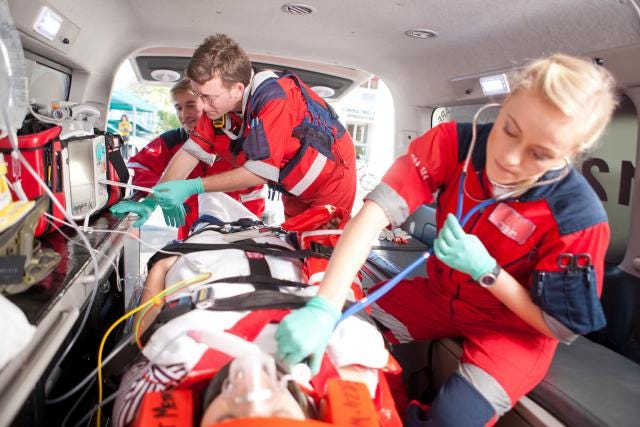Compassion Fatigue
What is compassion fatigue? It develops when one person cares too much for another individual. Compassion fatigue is the physical, emotional, mental and spiritual depletion associated with caring for patients. In other words, it’s burnout.

Usually people in the helping field, such as health care professionals (doctors, nurses, first responders, paramedics, Physician Assistants, etc.), suffer from compassion fatigue. I worked as a paramedic for more than 10 years. I have suffered from PTSD and have had vicarious trauma. I started in Emergency Medical Services in 2003. I worked in transport teams, 911 system, in a mobile cardiac care unit and inside the Emergency Room. So I’ve experienced first hand how easily a medical professional get burnout.
In the healthcare field, self-neglect is glorified. It is expected of the healthcare professional to work long hours and to forget to nourish his or her body with food. He or she does not even have time to use the restroom. It is a sin! Often those who take 15 minute breaks get chastised.
Healthcare professionals are expected to care for their patients but not themselves. Not only are they expected to work non-stop, they also get abused by patients, family members, other hospital staff and administration. This is normal in hospitals, fire departments and other health facilities. These are all part of the job. It is part of the culture, but it also doesn’t make it right.

Most doctors, nurses, medics, PAs and other healthcare professionals enter the healthcare field with the intention to help others and to provide empathetic care to those who are hurt or in need. But with the overwhelming demands of patients and their families, hospital administration and the long working hours can be very stressful and may result in compassion fatigue.
This culture did not come out of nowhere. This is a culture that has been passed on from generation to generation. Compassion fatigue or burnout affects the professional’s job satisfaction. It affects the professional’s emotional and physical health. It also affects the work place environment by decreasing productivity, decrease in morale and increase in turnover and suicide.
Can it be fixed?
Yes, it can be fixed. Healing an organization takes time, patience and a lot of commitment. The administration needs to be very aware about the status of the mental and emotional health of their employees. An awareness of compassion fatigue must be present at the highest level of leadership and then it trickles down to the staff.
So the leaders must have that dialogue with their employees. Open communication with empathetic ears between the leader and the team members will build rapport that cultivates loyalty and creates a win-win situation. If both parties trust each other then an organization can change for the better.
Most healthcare professionals do not get paid a lot. Their jobs are stressful and sometimes dangerous as well. There’s a lack of growth, career advancement, a lot of inconsistency and a high turnover rate in the healthcare field. The passion of helping others is diminished when the healthcare professional is not being taken care of.

As individuals, healthcare professionals need to advocate for themselves. It is their own responsibility to understand how their jobs affect them emotionally, mentally and physically.
Here are some tools you can use:
- Prioritize yourself — I hope that you prioritize yourself and not your spouse, your kids, your job and not strangers. You should be number 1 on your list. You are no good to others if you’re not well. Schedule time to do the things you love. Put on your calendar the activities that makes you feel fulfilled. Challenge yourself to do something that will make you happy. Schedule a “me time” at least once a week.

- Wherever you are, be there — Be in the moment. Don’t multi-task. In the medical field, multi-tasking is part of your skill but when you’re not working, focus on one thing. It is okay to slow down and take a breather. Take that time off that you totally deserve. Quiet your mind and be present. Put away your phones. When you’re out with family, friends or significant other, focus on them. Focus on the activity that you’re doing. Enjoy it! Relax! Allow yourself some headspace. There are so many distractions (work, politics, news, other people’s lives on social media), but you need to be present wherever you are — physically and mentally.

- Be With The Right People — Negativity is contagious. It is easier to join in on the misery of others than to be that positive vibe. Misery loves company. In the workplace, you can get sucked in so easily in that negative black hole. Walk away, don’t join or you’ll be one of those people who complain and whine a lot. Be the solution instead. Speak-up when you see things that are not right. It’s empowering when you stand-up for what you believe is right. If the organization that you are in shuts you down all the time or ignores your needs then plan on moving-on. You’re not a tree. You’re not really stuck. Make a plan of trying to find a place that is a better fit for you and a place where you can be fulfilled and appreciated. Surround yourself with people who will make you feel good about yourself and about your job.

Your job as a caring professional in the “helping” profession should be fulfilling. The jobs in the healthcare field are not easy. If you feel like it is hard for you to shake off loneliness or anxiety, get the professional help that you need. There’s no shame to it. Emotional and psychological traumas happen to everyone. It can be cause by a one time event, ongoing stress like work, break-up/divorce, surgery or bullying or any disappointing experiences. Working through trauma alone is daunting, lonely and re-traumatizing.A trauma therapist can help with your healing. Vicarious trauma happens to all healthcare professionals.
Join our healthcare professional support group every other Tuesdays in Jenkintown, PA. It is a safe place to vent, share your work experiences and to provide support to other helpers like you who are going through the same stresses. Compassion fatigue exists. Vicarious trauma is real. Suicide in the healthcare profession is increasing. There are ways to get through the stresses of work, help is available. E-mail rmwcounseling@gmail.com.
